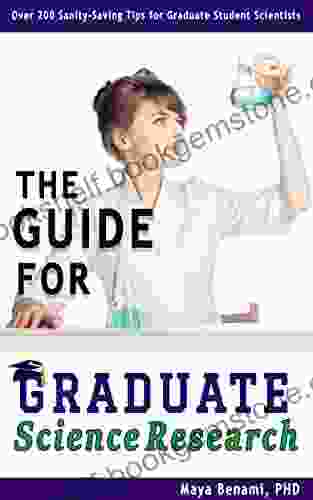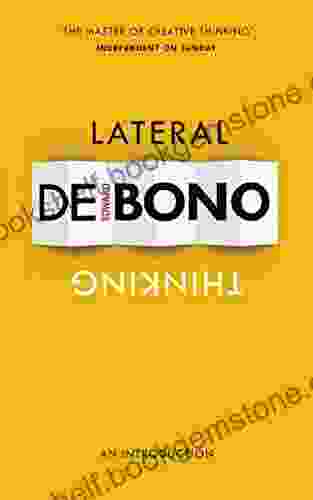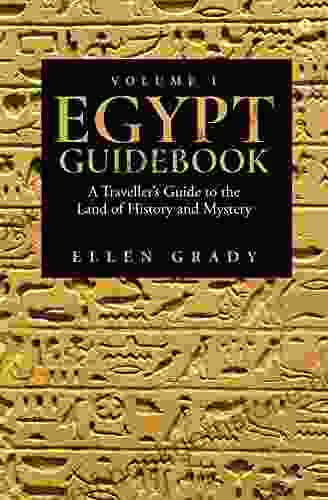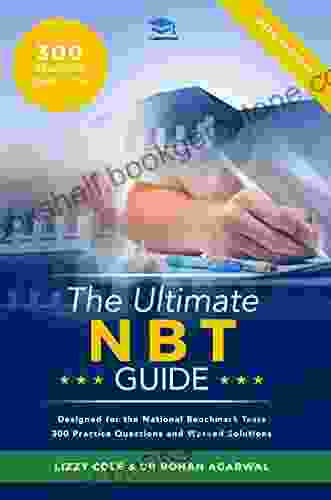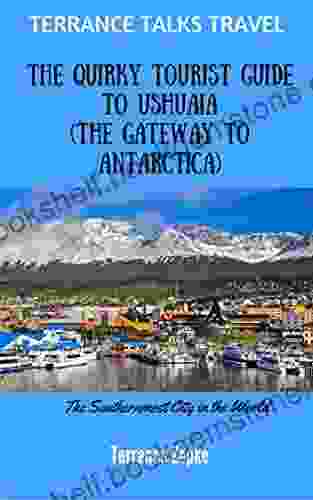The Ultimate Guide to Graduate Science Research: A Comprehensive Resource for Aspiring Researchers

Graduate science research is an exciting and challenging endeavor that can lead to groundbreaking discoveries and advancements in our understanding of the world around us. However, it can also be a daunting task, especially for those just starting out. This comprehensive guide provides aspiring graduate science researchers with a wealth of knowledge and practical advice on every aspect of the research process, from choosing a research topic to writing a successful thesis or dissertation.
5 out of 5
| Language | : | English |
| File size | : | 809 KB |
| Text-to-Speech | : | Enabled |
| Enhanced typesetting | : | Enabled |
| Word Wise | : | Enabled |
| Print length | : | 64 pages |
| Lending | : | Enabled |
| Screen Reader | : | Supported |
Choosing a Research Topic
The first step in any research project is to choose a research topic. This is a crucial decision that will shape the direction of your research and determine the success of your project. When choosing a research topic, it is important to consider the following factors:
- Your interests: What topics are you passionate about? What areas of science do you find most fascinating?
- Your skills and expertise: What are your strengths and weaknesses as a researcher? What skills do you need to develop in order to be successful in your research?
- The feasibility of the project: Is the project realistic given the resources you have available? Do you have the time, funding, and support to complete the project successfully?
Once you have considered these factors, you can start to narrow down your research topic. It is helpful to talk to your advisor, other professors, and other researchers in your field to get their input on potential research topics.
Conducting Your Research
Once you have chosen a research topic, you can begin conducting your research. This involves gathering data, analyzing data, and interpreting your results. The specific methods you use will vary depending on the nature of your research project. However, there are some general principles that apply to all research projects:
- Be systematic and organized: Keep track of your data and your analysis methods. This will help you to stay on track and avoid making mistakes.
- Be critical of your own work: Always question your assumptions and your results. Be willing to revise your research plan as needed.
- Collaborate with others: Get feedback from other researchers and experts in your field. This can help you to improve your research and avoid making mistakes.
The research process can be long and challenging, but it is also rewarding. By following these principles, you can increase your chances of success and make a meaningful contribution to your field of study.
Writing Your Thesis or Dissertation
The final step in the research process is to write your thesis or dissertation. This is a major undertaking, but it is also an opportunity to showcase your research findings and demonstrate your skills as a researcher. When writing your thesis or dissertation, it is important to keep the following tips in mind:
- Start early: Give yourself plenty of time to write your thesis or dissertation. This will help you to avoid stress and ensure that you produce a high-quality product.
- Organize your work: Create an outline and stick to it. This will help you to stay on track and avoid getting overwhelmed.
- Write clearly and concisely: Your thesis or dissertation should be easy to read and understand. Avoid using jargon and technical terms that your audience may not be familiar with.
- Get feedback from others: Ask your advisor, other professors, and other researchers to read and critique your work. This can help you to improve your writing and identify any areas that need improvement.
Writing a thesis or dissertation is a challenging task, but it is also an important milestone in your academic career. By following these tips, you can increase your chances of success and produce a high-quality thesis or dissertation that will make you proud.
Graduate science research is a challenging but rewarding endeavor. By following the advice in this guide, you can increase your chances of success and make a meaningful contribution to your field of study. Remember, the research process is a journey, not a destination. Enjoy the process and learn from your experiences along the way.
Additional Resources
- National Science Foundation: Preparing Graduate Students for Scientific and Engineering Research Careers
- National Institutes of Health: A Guide to Research Methods in the Social and Behavioral Sciences
- Elsevier: Scientific Research in Education
5 out of 5
| Language | : | English |
| File size | : | 809 KB |
| Text-to-Speech | : | Enabled |
| Enhanced typesetting | : | Enabled |
| Word Wise | : | Enabled |
| Print length | : | 64 pages |
| Lending | : | Enabled |
| Screen Reader | : | Supported |
Do you want to contribute by writing guest posts on this blog?
Please contact us and send us a resume of previous articles that you have written.
 Best Book
Best Book Page Flip
Page Flip Bookshelf
Bookshelf Literary loom
Literary loom Chapter
Chapter Bookish
Bookish PageTurner
PageTurner Bibliophile
Bibliophile Story
Story Inkwell
Inkwell Bookworm
Bookworm Labyrinth
Labyrinth Plot Twist
Plot Twist Prose
Prose Paperback
Paperback Storyteller
Storyteller Sanctuary
Sanctuary Fiction
Fiction Reading
Reading Chronicle
Chronicle Read
Read Gerry Lekas
Gerry Lekas Alex Kava
Alex Kava Maoz Azaryahu
Maoz Azaryahu 1st Edition Kindle Edition
1st Edition Kindle Edition Stephen Haddelsey
Stephen Haddelsey Cristen Hemingway Jaynes
Cristen Hemingway Jaynes Elizabeth Gardner
Elizabeth Gardner Rashaun Johnson
Rashaun Johnson Original Edition Kindle Edition
Original Edition Kindle Edition Tara Kangarlou
Tara Kangarlou Corine Gantz
Corine Gantz Josh Tabor
Josh Tabor Daily Language Learning
Daily Language Learning Anselme Baud
Anselme Baud Joshua Obanijesu
Joshua Obanijesu Nick Jans
Nick Jans Joe Abercrombie
Joe Abercrombie Martin J Pring
Martin J Pring Tracy Brown Collins
Tracy Brown Collins James Teitelbaum
James Teitelbaum Scott Graham
Scott Graham Baby Professor
Baby Professor Jason E Portnof
Jason E Portnof Barbara A Lynch Johnt
Barbara A Lynch Johnt Debbie S Miller
Debbie S Miller Bonnie Bley
Bonnie Bley Brian Leaf
Brian Leaf Raja Shehadeh
Raja Shehadeh Marek Sobski
Marek Sobski Stephen J Pyne
Stephen J Pyne Darryl Hughes
Darryl Hughes Johan Reinhard
Johan Reinhard Sylvain Tesson
Sylvain Tesson Deborah Miller
Deborah Miller Christine Wiebe
Christine Wiebe Paul Volponi
Paul Volponi Michael Lieberman
Michael Lieberman John Biggam
John Biggam Ken Horlor
Ken Horlor Nilakantasrinivasan J Neil
Nilakantasrinivasan J Neil Manfred Theisen
Manfred Theisen Nicole Chung
Nicole Chung Sarah Vowell
Sarah Vowell Bob Reiss
Bob Reiss Kyoan
Kyoan Alice Morse Earle
Alice Morse Earle Robin Hobb
Robin Hobb Tanmay Mehta
Tanmay Mehta Kate Maloy
Kate Maloy Ed Stafford
Ed Stafford Barry Eisler
Barry Eisler Ryan Murdock
Ryan Murdock Amanda Barnes
Amanda Barnes Charles A Wells
Charles A Wells Bruce Boudreau
Bruce Boudreau C Michael Hiam
C Michael Hiam Steve Sorensen
Steve Sorensen Bruce Spydar
Bruce Spydar Martin Sternstein
Martin Sternstein Viki Winterton
Viki Winterton Janet E Wall
Janet E Wall 4th Edition Kindle Edition
4th Edition Kindle Edition Glenn Rivers
Glenn Rivers Sarah Smierciak
Sarah Smierciak Brandon Royal
Brandon Royal Lsatmax Lsat Prep
Lsatmax Lsat Prep Paul Deepan
Paul Deepan Lee Jamison
Lee Jamison Maya Benami
Maya Benami Tristan Jones
Tristan Jones John Muir
John Muir Wilfred Cude
Wilfred Cude Paul Watson
Paul Watson Chris Fagan
Chris Fagan Businessnews Publishing
Businessnews Publishing Ben Buckton
Ben Buckton Beryl Ratzer
Beryl Ratzer Kevin Griffith
Kevin Griffith Penelope Douglas
Penelope Douglas Peter Nichols
Peter Nichols William Cowper Prime
William Cowper Prime Jason Zemcik
Jason Zemcik Schoolhouse Heaven
Schoolhouse Heaven Sam Quek
Sam Quek Balazs Csigi
Balazs Csigi Kay Walten
Kay Walten Nanette Witmer
Nanette Witmer Trish Nicholson
Trish Nicholson Thant Myint U
Thant Myint U Barbara Mould Young
Barbara Mould Young Nick Kypreos
Nick Kypreos David Newton
David Newton Clay Boutwell
Clay Boutwell Thaddeus Hatter
Thaddeus Hatter Ryszard Kapuscinski
Ryszard Kapuscinski R M Patterson
R M Patterson Jay Greeson
Jay Greeson Nahee Park
Nahee Park Griselda Sprigg
Griselda Sprigg Bill Ingersoll
Bill Ingersoll Lance Pototschnik
Lance Pototschnik John Gregory Smith
John Gregory Smith Scott Colby
Scott Colby Steven Schneider
Steven Schneider David Morris
David Morris Taras Grescoe
Taras Grescoe Peter Barber
Peter Barber Gabriel J Connor
Gabriel J Connor Illustrated Edition Kindle Edition
Illustrated Edition Kindle Edition Deanne Howell
Deanne Howell Annika Hernroth Rothstein
Annika Hernroth Rothstein Rodney Paul
Rodney Paul Janet Beissinger
Janet Beissinger Gebshu Kukhet
Gebshu Kukhet Walter Dare
Walter Dare Lucas Burns
Lucas Burns Lawrence W Tuller
Lawrence W Tuller John Morrison
John Morrison C F Carter
C F Carter Bob Mckenzie
Bob Mckenzie Ingo Berensmeyer
Ingo Berensmeyer Arthur Miller
Arthur Miller Noor Ain
Noor Ain Tao Le
Tao Le David Faulkner
David Faulkner Lori Haskins Houran
Lori Haskins Houran Frank Ayres
Frank Ayres Shannon Enete
Shannon Enete James Good
James Good Anthony J Bennett
Anthony J Bennett Lynda Jones
Lynda Jones Jerry A Pattengale
Jerry A Pattengale John Hodgman
John Hodgman Julia Ann Clayton
Julia Ann Clayton Dinesh Kumar Goyal
Dinesh Kumar Goyal Michael R Lindeburg
Michael R Lindeburg Pierluigi Spagnolo
Pierluigi Spagnolo Kim Dinan
Kim Dinan Dr Hooelz
Dr Hooelz Heather E Schwartz
Heather E Schwartz Paul Cobley
Paul Cobley Lori Schumacher
Lori Schumacher James Grant Peterkin
James Grant Peterkin Ashley Schmitt
Ashley Schmitt James A Cashin
James A Cashin Russell Clark
Russell Clark Bobby Orr
Bobby Orr Kathleen Kirkland
Kathleen Kirkland Bob Duff
Bob Duff Bill Streever
Bill Streever T I Lowe
T I Lowe Julie Argyle
Julie Argyle Matt Rendell
Matt Rendell Cathy A Malchiodi
Cathy A Malchiodi Craig M Kershaw
Craig M Kershaw Pamela K Lamb
Pamela K Lamb Charles H Dyer
Charles H Dyer Direct Hits
Direct Hits Roberta Raigh Pryor
Roberta Raigh Pryor Brian Reddington
Brian Reddington George J Hademenos
George J Hademenos Genius Reads
Genius Reads Dawn Adlam
Dawn Adlam Pat Guy
Pat Guy Printright
Printright David L Golemon
David L Golemon Jonathan A Levi
Jonathan A Levi Brandon Sanderson
Brandon Sanderson Kingsley Augustine
Kingsley Augustine Graham Mackintosh
Graham Mackintosh Vincent Chidindu Asogwa
Vincent Chidindu Asogwa E C Murray
E C Murray Annabel Chase
Annabel Chase Ben Egginton
Ben Egginton Marcia Langton
Marcia Langton Sharon Asher
Sharon Asher Jon A Archambault
Jon A Archambault Nicky Pellegrino
Nicky Pellegrino Mario Rizzi
Mario Rizzi William Least Heat Moon
William Least Heat Moon Stephen Graham
Stephen Graham 8th Edition Kindle Edition
8th Edition Kindle Edition Julie Tagg
Julie Tagg Chris Moss
Chris Moss Pati Jinich
Pati Jinich Haim Watzman
Haim Watzman Anton Chekhov
Anton Chekhov Richard Connor
Richard Connor The Total Travel Guide Company
The Total Travel Guide Company Brent J Burrows Ii
Brent J Burrows Ii Julian Mcdougall
Julian Mcdougall Texes Exam Secrets Test Prep Team
Texes Exam Secrets Test Prep Team Smart Edition
Smart Edition Karen O Toole
Karen O Toole Arianna Astuni
Arianna Astuni James Patterson
James Patterson Russ Howard
Russ Howard David Churchman
David Churchman Daniel Farcas
Daniel Farcas Hugh Henderson
Hugh Henderson Alina Adams
Alina Adams Intelligent
Intelligent Benjamin Smith
Benjamin Smith Daniel Mode
Daniel Mode Mary Ann Hogan
Mary Ann Hogan Cathy Jackson
Cathy Jackson Les Weatheritt
Les Weatheritt R Bruce Richardson
R Bruce Richardson Devaki Lakshmi
Devaki Lakshmi Wendy Francis
Wendy Francis Rick Townsend
Rick Townsend Gideon Labiner
Gideon Labiner Ruth Garner
Ruth Garner Jim Harrison
Jim Harrison Eric Simons
Eric Simons Dk Eyewitness
Dk Eyewitness Tom Palmer
Tom Palmer Ben Cook
Ben Cook Anne E Brevig
Anne E Brevig Lisa Mcclendon Sims
Lisa Mcclendon Sims Paddy Mcqueen
Paddy Mcqueen Mandee Heller Adler
Mandee Heller Adler Tracy Owens
Tracy Owens Approach Guides
Approach Guides Sybille Bedford
Sybille Bedford I C Robledo
I C Robledo Jay Griffiths
Jay Griffiths Jason Hogan
Jason Hogan Simon Gervais
Simon Gervais Dr John T Whiting
Dr John T Whiting Jess Tiffany
Jess Tiffany Robert A Johnson
Robert A Johnson David Mcilroy
David Mcilroy Susan Davis Becker
Susan Davis Becker Elijah N Daniel
Elijah N Daniel Nicholas Hirshon
Nicholas Hirshon Tony Burton
Tony Burton Cyprian Mendonca
Cyprian Mendonca Ged Gillmore
Ged Gillmore Christina Pawlowski
Christina Pawlowski Mike Sonnenberg
Mike Sonnenberg William W Johnstone
William W Johnstone Carrie Winstanley
Carrie Winstanley Sean Dooley
Sean Dooley Luisa Gastambide
Luisa Gastambide Er Sunil Batra
Er Sunil Batra Stephen Hui
Stephen Hui Eric Seale
Eric Seale Mark Donnelly
Mark Donnelly Dan Myers
Dan Myers Kim Heinbuch
Kim Heinbuch Jose M Forero Bautista
Jose M Forero Bautista Katherine Dunham
Katherine Dunham Kayla Chalko
Kayla Chalko Johnny Quinn
Johnny Quinn C Rich
C Rich Brian Clegg
Brian Clegg Tommy Xiao Wan
Tommy Xiao Wan Damion Hunter
Damion Hunter Quick Reads
Quick Reads Kevin Milton
Kevin Milton Rosemarie Allen
Rosemarie Allen Omni Reads
Omni Reads Sally Poncet
Sally Poncet Innovative Language Learning
Innovative Language Learning Louise Heal Kawai
Louise Heal Kawai Linda Anne Silvestri
Linda Anne Silvestri James Rollins
James Rollins Alexandria House
Alexandria House Paul Noble
Paul Noble John R Morgan
John R Morgan Magi Nams
Magi Nams Freya Stark
Freya Stark Big Daddy Ozone
Big Daddy Ozone Dmv Test Bank
Dmv Test Bank Beth Bartolini Salimbeni
Beth Bartolini Salimbeni Ronald A Reis
Ronald A Reis Templeton Peck
Templeton Peck Hicham And Mohamed Ibnalkadi
Hicham And Mohamed Ibnalkadi Barbara Allan
Barbara Allan John Gilstrap
John Gilstrap Nick Adams
Nick Adams Joseph Mctaggart
Joseph Mctaggart Shannon Dittemore
Shannon Dittemore Lonely Planet
Lonely Planet Tim Brown
Tim Brown Paul Blanchard
Paul Blanchard Marty Ofonagoro
Marty Ofonagoro Daryl Balfour
Daryl Balfour Barbara Fradkin
Barbara Fradkin Susan Meissner
Susan Meissner Gail Fay
Gail Fay Michel Roy
Michel Roy Ed Willes
Ed Willes Sacha Black
Sacha Black Tyler Omoth
Tyler Omoth Bob Goddard
Bob Goddard Mark Zegarelli
Mark Zegarelli Leckie
Leckie Jude Deveraux
Jude Deveraux Stephanie Saldana
Stephanie Saldana Nat Brown
Nat Brown Blether Travel Guides
Blether Travel Guides Chuck Gormley
Chuck Gormley Laurie Frankel
Laurie Frankel Vincent Min
Vincent Min Barbara Krumhardt
Barbara Krumhardt Jeanne St James
Jeanne St James Wendy C Crone
Wendy C Crone Wayne Stewart
Wayne Stewart Kelli Lawrence
Kelli Lawrence Angelo Tropea
Angelo Tropea Lizabeth Hardman
Lizabeth Hardman Test Masters
Test Masters Ruth Everhart
Ruth Everhart Bruce Barcott
Bruce Barcott Naomi Hansen
Naomi Hansen Scott Coplan
Scott Coplan Ari Mennander
Ari Mennander Richard Sattora
Richard Sattora Jeffrey Brautigam
Jeffrey Brautigam Clifford D Stark
Clifford D Stark Gerald Durrell
Gerald Durrell Nelson Demille
Nelson Demille Blake Banner
Blake Banner Roderick J Fraser Jr
Roderick J Fraser Jr Brian Andrews
Brian Andrews Brad Dude
Brad Dude Rebecca Kaye
Rebecca Kaye Pamela Bartley
Pamela Bartley Wolfedale Press
Wolfedale Press Print Replica Kindle Edition
Print Replica Kindle Edition Anna Curran
Anna Curran Richard Bronson
Richard Bronson Caryn Boddie
Caryn Boddie Pico Iyer
Pico Iyer Curving Earth Publishing
Curving Earth Publishing Suzanne Brickman
Suzanne Brickman Indy Quillen
Indy Quillen Simon Bird
Simon Bird Phyllis Folb
Phyllis Folb Bruno Grelon
Bruno Grelon Geraldine Woods
Geraldine Woods Rajani Katta
Rajani Katta Dennis Stemmle
Dennis Stemmle Barzin Pakandam
Barzin Pakandam Maha Alkurdi
Maha Alkurdi Frances Mayes
Frances Mayes Gary Robert Muschla
Gary Robert Muschla Borja Loma Barrie
Borja Loma Barrie Rod Nordland
Rod Nordland Yuki Mano
Yuki Mano Kindle Edition
Kindle Edition Mitt Romney
Mitt Romney Thad Vogler
Thad Vogler Eli Wilson
Eli Wilson Reinaldo Arenas
Reinaldo Arenas Simon Winchester
Simon Winchester Ted Dorsey
Ted Dorsey Nishant Jindal
Nishant Jindal Robert Louis Stevenson
Robert Louis Stevenson Terry Palechuk
Terry Palechuk Brandon Stanton
Brandon Stanton Bruce Rosenfeld
Bruce Rosenfeld Doretta Groenendyk
Doretta Groenendyk Korrel Kanoy
Korrel Kanoy Go Books
Go Books Leland Chant
Leland Chant Chris Santella
Chris Santella Funso Aiyejina
Funso Aiyejina Marie Cirano
Marie Cirano Georgios Papadakis
Georgios Papadakis Ginger Sinsabaugh
Ginger Sinsabaugh Bryan Ethier
Bryan Ethier College Hippo
College Hippo Hans Staden
Hans Staden Jennifer Steil
Jennifer Steil Lisa Kleypas
Lisa Kleypas Gill James
Gill James Tim Severin
Tim Severin J A Johnstone
J A Johnstone Asrai Devin
Asrai Devin James A Michener
James A Michener Arden Rembert Brink
Arden Rembert Brink Mark Greenside
Mark Greenside Osasumwen Asoro
Osasumwen Asoro Brian Kent
Brian Kent James D Giovannini
James D Giovannini David Baldacci
David Baldacci Mary Jo Mcconahay
Mary Jo Mcconahay Pamela And Fred Peters
Pamela And Fred Peters Katie Malachuk
Katie Malachuk Tim Wharnsby
Tim Wharnsby Stephanie Lewis
Stephanie Lewis Dr John Hockey
Dr John Hockey Seymour Resnick
Seymour Resnick Ben Wildavsky
Ben Wildavsky Mathivanan Palraj
Mathivanan Palraj Nathan Halberstadt
Nathan Halberstadt Jamie Pedrazzoli
Jamie Pedrazzoli Blair Braverman
Blair Braverman Erica Abbett
Erica Abbett Bob Smale
Bob Smale Sadeqa Johnson
Sadeqa Johnson Shannon Ables
Shannon Ables Doug Hall
Doug Hall Jane Bottomley
Jane Bottomley Shawn Inmon
Shawn Inmon Tina Cho
Tina Cho Christie Sausa
Christie Sausa Joanna Kujawa
Joanna Kujawa Lisa Pietsch
Lisa Pietsch Christine A Smyczynski
Christine A Smyczynski Elke Gschossmann Hendershot
Elke Gschossmann Hendershot William Friar
William Friar Sue Tyson Ward
Sue Tyson Ward Janet Evans
Janet Evans H M Conroy
H M Conroy Peter Ballin
Peter Ballin Lori Evert
Lori Evert Nikki Kazimova
Nikki Kazimova Judy Tilton Brunner
Judy Tilton Brunner Bryan Nelson
Bryan Nelson Jon B Barry
Jon B Barry N K Jemisin
N K Jemisin Marcia Desanctis
Marcia Desanctis John Hersey
John Hersey Chantel Acevedo
Chantel Acevedo Matt Kalman
Matt Kalman Daniel Putkowski
Daniel Putkowski Steve Sonntag
Steve Sonntag Robert Andrew Powell
Robert Andrew Powell Sandra Cain
Sandra Cain Bruce Heyman
Bruce Heyman Barry Broadfoot
Barry Broadfoot Bret Baier
Bret Baier Susan Straight
Susan Straight Michael V Uschan
Michael V Uschan Rafael Ocasio
Rafael Ocasio Study Guide Edition Kindle Edition
Study Guide Edition Kindle Edition Kristin Hannah
Kristin Hannah Jon C Stott
Jon C Stott Steve Hely
Steve Hely Sergio Rassu
Sergio Rassu Dojolab Inc
Dojolab Inc Atul Kalhan
Atul Kalhan Peter Mcdougall
Peter Mcdougall Tiara R Brown
Tiara R Brown Sigurd F Olson
Sigurd F Olson Jeri Magg
Jeri Magg Leslie Thomas
Leslie Thomas Jacob Brezinski
Jacob Brezinski Kenneth Cline
Kenneth Cline Levison Wood
Levison Wood Sunny Lockwood
Sunny Lockwood Pass Your Class
Pass Your Class John Otis
John Otis Nicholas Gagnier
Nicholas Gagnier Robert Crais
Robert Crais Gregory J Privitera
Gregory J Privitera American Math Academy
American Math Academy Judy Lipson
Judy Lipson Vernon G Zunker
Vernon G Zunker Sumoreads
Sumoreads Don L Gates
Don L Gates Emma Sue Prince
Emma Sue Prince Diane Lindsey Reeves
Diane Lindsey Reeves Craig Medico
Craig Medico Zigzag English
Zigzag English Susan Jane Gilman
Susan Jane Gilman Meghan Mccarthy
Meghan Mccarthy Disha Experts
Disha Experts Shirley J Shepherd
Shirley J Shepherd Brad Olsen
Brad Olsen Anne Strathie
Anne Strathie Tara Baukus Mello
Tara Baukus Mello Robert Caprio
Robert Caprio Joseph A Citro
Joseph A Citro Roald Amundsen
Roald Amundsen Devin Carroll
Devin Carroll Karen George
Karen George R K Agarwal
R K Agarwal Greg Jacobs
Greg Jacobs Bobby Newman
Bobby Newman Rebecca Westrup
Rebecca Westrup Tia Williams
Tia Williams John Mcphee
John Mcphee Michael Vlessides
Michael Vlessides Steven Rothfeld
Steven Rothfeld Russell Blake
Russell Blake Oliver Bullough
Oliver Bullough Suzanne Reece
Suzanne Reece Joseph Toone
Joseph Toone Greg Wyshynski
Greg Wyshynski Gregory Maassen
Gregory Maassen Michael Tefula
Michael Tefula Brien Foerster
Brien Foerster Gwenda Cornell
Gwenda Cornell Neal Patterson
Neal Patterson Rets Griffith
Rets Griffith Brett Edward Whalen
Brett Edward Whalen Jack Donnelly
Jack Donnelly Sara Dawn Johnson
Sara Dawn Johnson Karen Hill Anton
Karen Hill Anton Lauren Lucien
Lauren Lucien Vicki Hearne
Vicki Hearne Peter Liljedahl
Peter Liljedahl Bruce Berglund
Bruce Berglund Erfun Geula
Erfun Geula Nirosha Ruwan
Nirosha Ruwan S K Gupta
S K Gupta Alison Mcghee
Alison Mcghee Charles Dickens
Charles Dickens Donnie Smith
Donnie Smith Marty Gitlin
Marty Gitlin C F Crist
C F Crist Orson Scott Card
Orson Scott Card Brad Anderson
Brad Anderson April Vahle Hamel
April Vahle Hamel Audiolearn Content Team
Audiolearn Content Team Gray Malin
Gray Malin Jan Tristan Gaspi
Jan Tristan Gaspi Rick Steves
Rick Steves Peterson S
Peterson S Miles Martin
Miles Martin Michael Egan
Michael Egan Robert Whiting
Robert Whiting Janine Robinson
Janine Robinson Nic Oatridge
Nic Oatridge Nancy Roe Pimm
Nancy Roe Pimm Andy Fine
Andy Fine Wilfred M Mcclay
Wilfred M Mcclay Maria Elena Alonso Sierra
Maria Elena Alonso Sierra Eunice Lewis Ph D
Eunice Lewis Ph D Boye Lafayette De Mente
Boye Lafayette De Mente William Pitts
William Pitts William Beebe
William Beebe Culture Smart
Culture Smart Janisse Ray
Janisse Ray Book Worm Publishing
Book Worm Publishing Laura Dave
Laura Dave Key Notes
Key Notes Kavitha M
Kavitha M Agnieszka Latocha
Agnieszka Latocha Egon Erwin Kisch
Egon Erwin Kisch Lois Pryce
Lois Pryce Thomas Booth
Thomas Booth Clair Lasater
Clair Lasater Hokulani K Aikau
Hokulani K Aikau Dan Fullerton
Dan Fullerton Stephen Tarsitano
Stephen Tarsitano Jose Antonio Vargas
Jose Antonio Vargas Jeff Kolby
Jeff Kolby Jackson Carter
Jackson Carter Terrance Zepke
Terrance Zepke William Mckeen
William Mckeen Pam Coburn
Pam Coburn My Daily Russian
My Daily Russian Natalya Androsova
Natalya Androsova W Michael Kelley
W Michael Kelley Marie Herbert
Marie Herbert Lila Z Rose
Lila Z Rose Darcy Gaechter
Darcy Gaechter Joeanna Rebello Fernandes
Joeanna Rebello Fernandes Beau Riffenburgh
Beau Riffenburgh Paul Oliver
Paul Oliver Burt L Standish
Burt L Standish
Light bulbAdvertise smarter! Our strategic ad space ensures maximum exposure. Reserve your spot today!
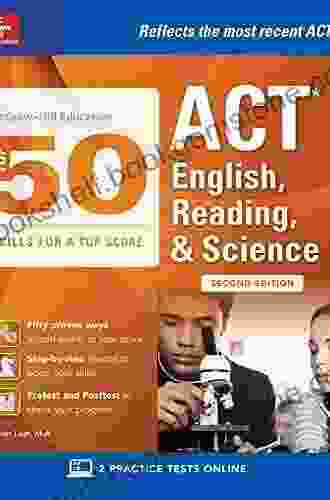
 Abe MitchellTop 50 ACT English Reading and Science Skills for Top Score, Second Edition:...
Abe MitchellTop 50 ACT English Reading and Science Skills for Top Score, Second Edition:...
 Dwight BlairUnveiling the Enigmatic Lost Ancient Technology of Egypt: A Journey into the...
Dwight BlairUnveiling the Enigmatic Lost Ancient Technology of Egypt: A Journey into the... Jamie BlairFollow ·8.9k
Jamie BlairFollow ·8.9k Craig CarterFollow ·5.9k
Craig CarterFollow ·5.9k Greg FosterFollow ·19.2k
Greg FosterFollow ·19.2k Milton BellFollow ·17.2k
Milton BellFollow ·17.2k Gordon CoxFollow ·19.4k
Gordon CoxFollow ·19.4k Tim ReedFollow ·10.1k
Tim ReedFollow ·10.1k Henry Wadsworth LongfellowFollow ·6.9k
Henry Wadsworth LongfellowFollow ·6.9k Levi PowellFollow ·16.7k
Levi PowellFollow ·16.7k
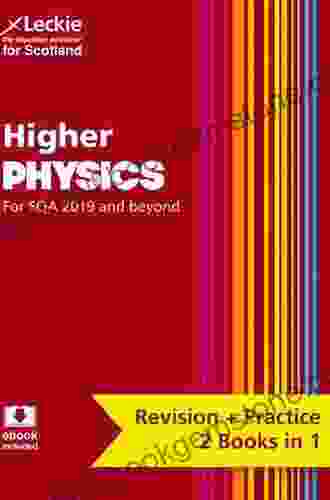
 Douglas Powell
Douglas PowellPreparation and Support for Teacher Assessment: Leckie...
Teacher assessment is an important part of...
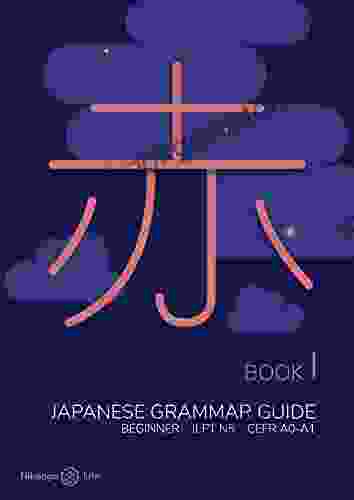
 Derek Bell
Derek BellMaster the Basics of Japanese Grammar: A Comprehensive...
Embarking on your journey to master the...
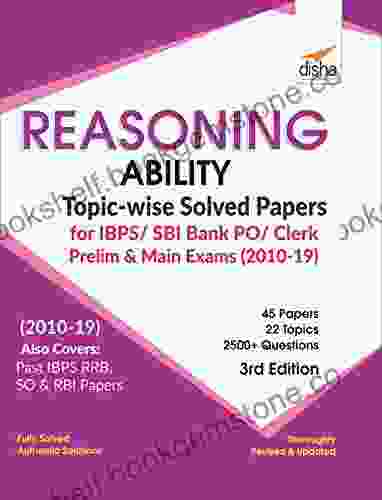
 Edison Mitchell
Edison MitchellReasoning Ability Topic Wise Solved Papers For IBPS SBI...
The Reasoning...

 F. Scott Fitzgerald
F. Scott FitzgeraldA New Survey of the West Indies, 1648: Broadway...
Published in...
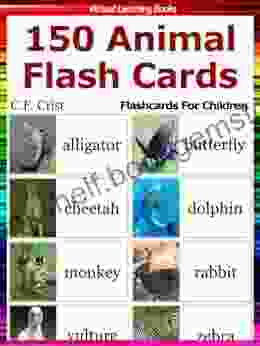
 Cooper Bell
Cooper BellPeekaboo Baby Toddler: 150 Animal Flash Cards for...
Are you ready to embark on...
5 out of 5
| Language | : | English |
| File size | : | 809 KB |
| Text-to-Speech | : | Enabled |
| Enhanced typesetting | : | Enabled |
| Word Wise | : | Enabled |
| Print length | : | 64 pages |
| Lending | : | Enabled |
| Screen Reader | : | Supported |


